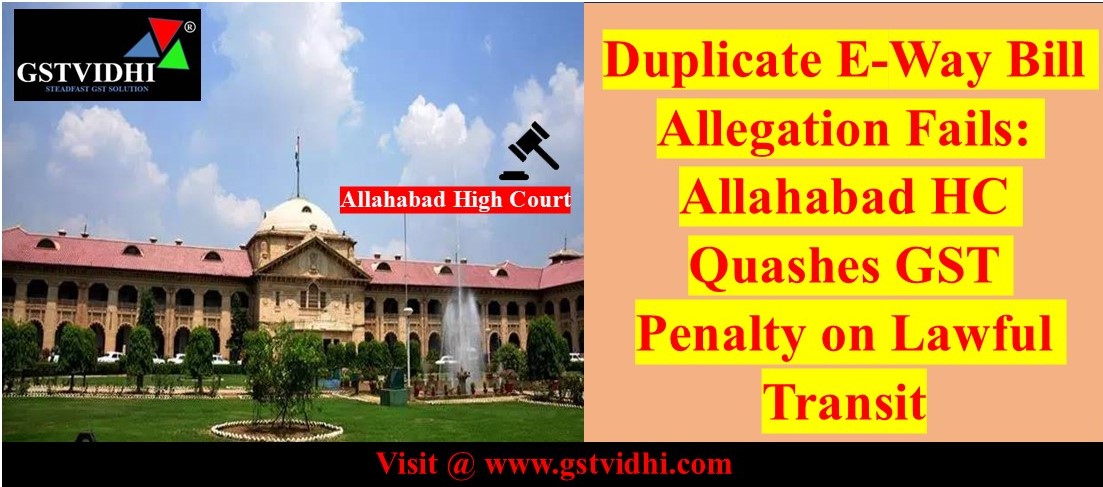
Penalty for Lawful E-Way Bill Transport Quashed: A Win for GST
Compliance in Transit
Case Title: M/s Sapan Trading Company
vs. State of Uttar Pradesh and Others
Case Number:
Writ Tax No. 475 of 2023
Neutral Citation: 2025:AHC:57026
Court: High Court of Judicature at
Allahabad, Court No. 9
Date of Order: 16 April 2025
Background and Context
With
the implementation of GST and the introduction of the e-way bill system under Rule
138 of the U.P. Goods and Services Tax Rules, 2017, the transportation of
goods has become a data-driven process. However, field-level enforcement often
faces situations where suspicion of tax evasion, rather than actual evidence,
leads to harsh punitive action.
In
this case, M/s Sapan Trading Company, a dealer of tobacco products,
approached the Allahabad High Court challenging the detention of goods and
imposition of penalty during inter-state transport. The core of the dispute was
the presumption by the GST authorities that a single vehicle was used
for multiple trips under the same e-way bill, even though all required
documents were in place.
Facts of the Case
- The petitioner purchased Pan
Masala and Zarda Scented Tobacco from M/s Sanjay Sales Agency,
Delhi.
- The goods were being transported from
Delhi to Indore, accompanied by:
- Two valid tax invoices
- Two e-way bills, generated at
1:35 a.m. and 1:36 a.m. on 17.12.2020.
- On 18.12.2020 at 18:36 hours,
the goods were intercepted at Sarendhi Kheragarh Road, Agra by the GST
mobile squad.
- Despite the presence of valid
documentation, the authorities imposed penalty under Section 129
of the GST Act.
- The reason cited: the vehicle was
suspected to have already crossed the toll plaza on 17.12.2020,
implying possible multiple trips using the same e-way bill.
Petitioner’s Submissions
1. Compliance
with Rule 138:
o The
consignment was duly documented with e-way bills and tax invoices as
required under GST laws.
o There
was no violation on the petitioner’s part.
2. Penalty
Based on Mere Presumption:
o The
entire case was built on a presumption that the vehicle had already
crossed the toll plaza once on 17.12.2020.
o No
evidence of actual multiple trips was provided.
3. Misinterpretation
by Authorities:
o The
authorities misread the facts, relying on assumptions rather than concrete
evidence.
o The
orders passed by the Taxing Authorities and Appellate Authority were non-speaking
and lacked merit.
Respondent’s Stand
The
Standing Counsel for the State contended:
- On the basis of information received,
the vehicle in question had already crossed a toll plaza on
17.12.2020.
- This led to a reasonable suspicion
that the goods may have been transported twice using the same documents.
Key Legal Provisions Invoked
Rule
138 of the U.P. GST Rules, 2017:
- Mandates that a valid e-way bill
and invoice must accompany the goods in transit.
- The petitioner strictly complied with
this provision.
Section
129 of the GST Act:
- Permits detention/seizure if there is
a contravention of provisions during transportation.
- In this case, no actual
contravention was established.
Observations and Findings by the High Court
Justice
Rohit Ranjan Agarwal analyzed the material on record and made the following
observations:
1. Goods
Were Lawfully Accompanied:
o Both
e-way bills and tax invoices were properly generated.
o They
matched the details of the consignment in the intercepted vehicle.
2. No
Actual Evidence of Violation:
o The
entire detention was based on apprehension that the goods had been
transported earlier.
o The
authorities failed to establish any documentary evidence that supported
the claim of repeated transportation.
3. No
Default on Part of Petitioner:
o The
court categorically held that there was no violation of Rule 138 by the
petitioner.
o The
penalty was found to be arbitrary and unwarranted.
4. Reasoned
Application of Law Required:
o Detention
and penalty under GST laws must be based on concrete facts, not on mere
speculation.
o The
authorities acted mechanically, without applying their minds to the
legality of the documentation.
Judgment
The
Allahabad High Court delivered a clear and firm ruling:
- The detention order and penalty
order are quashed.
- The order of the appellate
authority is also set aside.
- The penalty amount, if already
deposited, is to be refunded to the petitioner within 30 days from the
date of the order.
Conclusion
The
verdict in M/s Sapan Trading Company vs. State of U.P. is a landmark
reaffirmation of the principles of reasonableness and fairness in GST
enforcement. The court has rightly emphasized that procedural compliance
under GST must be assessed based on objective evidence, not administrative
suspicions.
Disclaimer: All
the Information is based on the notification, circular and order issued by the
Govt. authority and judgement delivered by the court or the authority
information is strictly for educational purposes and on the basis of our
best understanding of laws & not binding on anyone.
Find the Attachment (Press on Click Here )
Click here